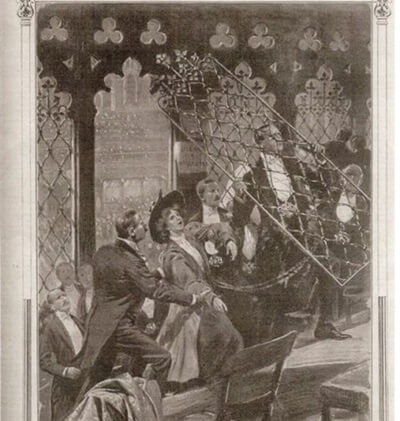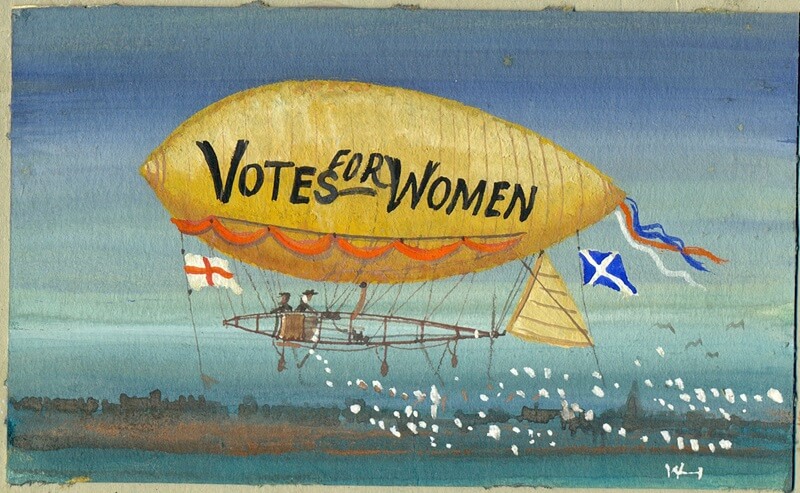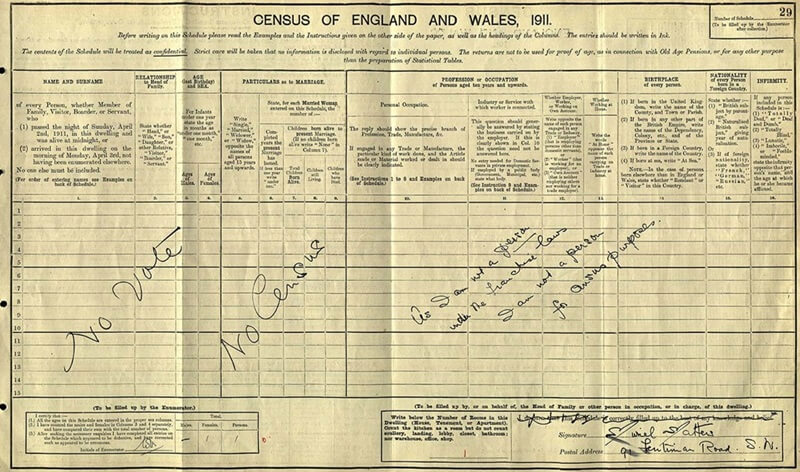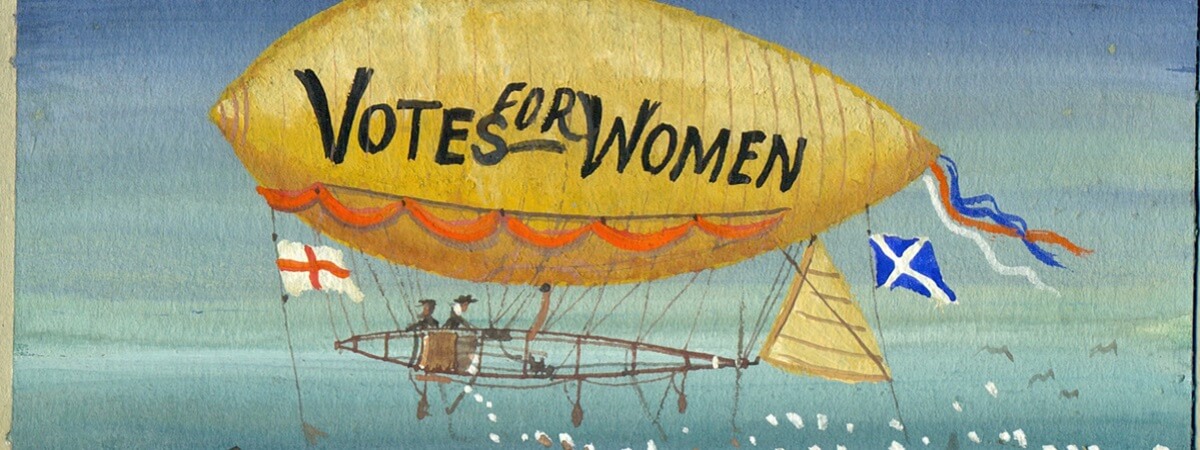A daredevil suffragette and “born agitator”
by Alison Bailey
In 1909 Muriel was famous worldwide after a series of daredevil stunts to promote Votes for Women. She lived in Penn for 25 years where most of her neighbours were probably unaware that Mrs Matters-Porter had been imprisoned in Holloway as one of the most notorious women in Britain.
Muriel Matters
Muriel was born in Adelaide in South Australia, the second surviving child in a family of 10. Her father, John, was a cabinet maker and committed Methodist, as was her mother Emma (née Warburton). The children were well-educated, and Muriel thrived, with a passion for the arts and reciting dramatic verse. She was 17 in1894, when Southern Australia became the first self-governing territory to give women the same voting rights as men, something that her socially reforming family believed in. Muriel studied music at the University of Adelaide for two years before deciding to pursue a career on the stage. She combined acting and performing recitals with teaching elocution. She had a growing reputation after receiving rave reviews for her dramatic rendition of Lord Tennyson’s Enoch Arden, accompanied by a pianist, but after a failed love affair, decided to try her luck in London.
She was 28 when she arrived in England in 1905 and had some success, performing at venues such as the Bechstein (now Wigmore) Hall. However, she supplemented her income by teaching elocution again and writing arts reviews, before finding her voice as a journalist campaigning for social reform.
Suffrage
Soon after arriving in London, Muriel attended meetings at Caxton Hall to hear Emmeline and Christabel Pankhurst speak and immediately took up the suffrage cause. However, instead of joining the Pankhurst’s Women’s Social and Political Union she was encouraged to join Charlotte Despard’s breakaway group, the Women’s Freedom League. Their colours were green, white and gold to distinguish themselves from the WSPU’s green, white and purple, and their slogan was Dare to be Free.
The executive team of the WFL recognised that Muriel, with “her magical voice” and attractive looks would be a huge asset. With her wide blue eyes and fair hair, she was the opposite of the caricature of an ugly suffragette with no hope of finding a husband. Although diminutive at 5’3”, her professional skills as a performer more than compensated. She had stage presence, authority, eloquence, powerful storytelling and above all volume! In exchange for a small stipend, she gave up performing and devoted herself fulltime to the cause.
Caravan Tour
It is likely that Muriel first came to Buckinghamshire in 1908 on a WFL caravan tour which she led around the counties of southern England, Wales and East Anglia. She made impassioned speeches from a caravan drawn by a horse called Asquith after the stubbornly anti-suffragist Prime Minister. In an interview in 1939 she described how she wore a mackintosh to protect her clothes from “the bad eggs and rotten fish which was the sort of thing we were up against.” In 1909 and 1912 she spoke at meetings in Chesham, cheerfully giving as good as she got to the men who heckled her.
The first woman to speak in the House of Commons

Muriel Matters was fearless. In 1908 she first made worldwide headlines by chaining herself to the grille of the Ladies’ Gallery high above the chamber of the House of Commons. This grille had huge significance for the suffrage campaigners, as it symbolised women’s exclusion from the political system. On 28 October 1908, with her colleague Helen Fox and close friend Violet Tillard (the latter carried a WFL proclamation banner), she gained admission to the Ladies’ Gallery. Muriel and Helen were both wearing heavy overcoats, and unknown to the stewards, underneath they wore thick leather belts and chains. At 8.30 pm during a particularly tedious debate on licensing laws they rushed forward, stripped off the coats and padlocked themselves to the grille. Muriel then made a loud speech demanding the vote for women. Soon policemen and stewards arrived but they couldn’t cut through the chains so that they had to remove them both; still attached to their respective grille panels which took more than half an hour. Although they had taken away her loudhailer Muriel was able to put all her public speaking skills to work and continued to lecture the men below. Consequently, Muriel is acknowledged as the first woman to have ‘spoken’ in the House of Commons. This action combined with a co-ordinated demonstration outside Parliament meant that some liberal papers applauded the “lion-hearted bravery” of the women and called Muriel the “Heroine of the Grille”. It also meant one month’s imprisonment in Holloway as a third division prisoner – a deeply unpleasant experience, mostly spent in solitary confinement.
The most famous woman in England
Undeterred, Muriel made worldwide headlines again in February 1909. She flew above London in an early airship, a dirigible balloon emblazoned with the words ‘Votes for Women’. The plan was for her to shower King Edward VII and the Houses of Parliament with pamphlets whilst delivering a speech with a loudhailer. Unfortunately, the wind blew the airship off course, and it eventually landed in a tree in Coulsdon, Surrey. Nevertheless, the stunt got incredible publicity, inspiring numerous cartoons, comic postcards and worldwide press coverage.

Muriel also supported the Tax Resistance League, the New Constitutional Society for Women’s Suffrage, and the Church League. In the 1911 Census she illegally defaced her form with the words “No Vote No Census As I am not a person under the Franchise Laws I am not a person for census purposes”.

WWI
In 1914 Muriel married William Porter, an American dentist, “as war had put an end to her suffrage activities”. Insisting on retaining her name, she became Mrs Matters-Porter in her married life but continued as Miss Muriel Matters in her professional life. A committed pacifist, in April 1915 Muriel organised a peace conference and helped form an organisation called Women Mobilising for Peace. She became the secretary of the British Committee of the International Council of Women, which was organising a peace conference in the Hague. She now returned to the lecture circuit but this time her speech was against the war, militarism and nationalism which was later distributed as a political pamphlet by the Peace Committee of the Society of Friends. She also called for women to step up and take on jobs in industries normally reserved for men and campaigned to raise funds for women’s hospitals in France and Serbia.
In August 1915 Muriel learnt that her younger brother, Charles, a sergeant in the 6th Battalion of the Australian Infantry, had been shot and killed at Lone Pine, Gallipoli.
In 1916 she trained in the Montessori teaching method with Maria Montessori in Barcelona and returned to London to run Sylvia Pankhurst’s school based in the Mother’s Arms in Bow (Sylvia had changed the name from the Gunmaker’s Arms). It also included a free medical clinic and workplace nursery and became the focal point of Muriel’s personal campaign for social justice and the subject of many later lectures.
Following the conclusion of the war and the subsequent increase of the electoral franchise to women over 30, Muriel had the opportunity to fulfil a dream that many had thought would never be possible. In 1924, she stood as the Labour Party candidate for Hastings in the General Election. Supported by her brother Leonard, who acted as her agent, she advocated further equality of the sexes, and greater distribution of wealth in tackling poverty and injustice but Hastings was not ready for such socialism and the Conservative candidate, Lord Eustace Percy, retained the seat.
Penn
Muriel and Bill had several houses in London and a weekend home in Hastings but in 1926 the couple left the capital and bought a substantial country house for Bill’s planned retirement, St John’s Orchard, in Manor Road, Penn. Several prominent suffragettes including Princess Sophia Duleep Singh, Louisa Garrett Anderson and Flora Murray Add Links had houses nearby and Muriel Matters was perhaps drawn there by bonds of friendship and shared experience. Muriel gradually withdrew from public life but retained her interest in education making friends with Mabel “Willo” Wilson, the principal of Elmtrees School, Great Missenden. This was part of the progressive Farmhouse School at Mayortorne Manor Wendover, founded by Isabel Fry
In 1939 Muriel was interviewed by the BBC, and when asked about her daring exploits, she replied: “I suppose it was daring, as one looks back from the point of view of age and perhaps wisdom. At the time I didn’t stop to think what a risky venture it was. I was young, and the experiences of the suffragettes soon taught one to be tough.”
After the death of her husband in 1949 Muriel sold St John’s Orchard and settled in Hastings where she died in 1969.
Legacy
On 5 January 2017, Hastings Borough Council honoured Muriel Matters, by renaming the main council offices ‘Muriel Matters House’.
The Muriel Matters Society About Muriel – The Muriel Matters Society Inc. was established in 2009 in South Australia by the independent Member for Florey, Frances Bedford. The MP also organised for a historic blue plaque to be put on Muriel’s house in Hastings. The Society’s play Why Muriel Matters was performed in the Adelaide Town Hall in June 2010, 100 years after Muriel appeared in the same venue. In 2013, a docu-drama called Muriel Matters! was presented at the Adelaide Film Festival and on ABC TV. Today a section of the brass grille that Muriel chained herself to is on display at the South Australian Houses of Parliament and a large mural portrays her on a street in Adelaide.
Sources
Miss Muriel Matters, the fearless suffragist who fought for equality by Robert Wainwright
About Muriel – The Muriel Matters Society Inc.
Muriel Matters – WW1 East Sussex (eastsussexww1.org.uk)

